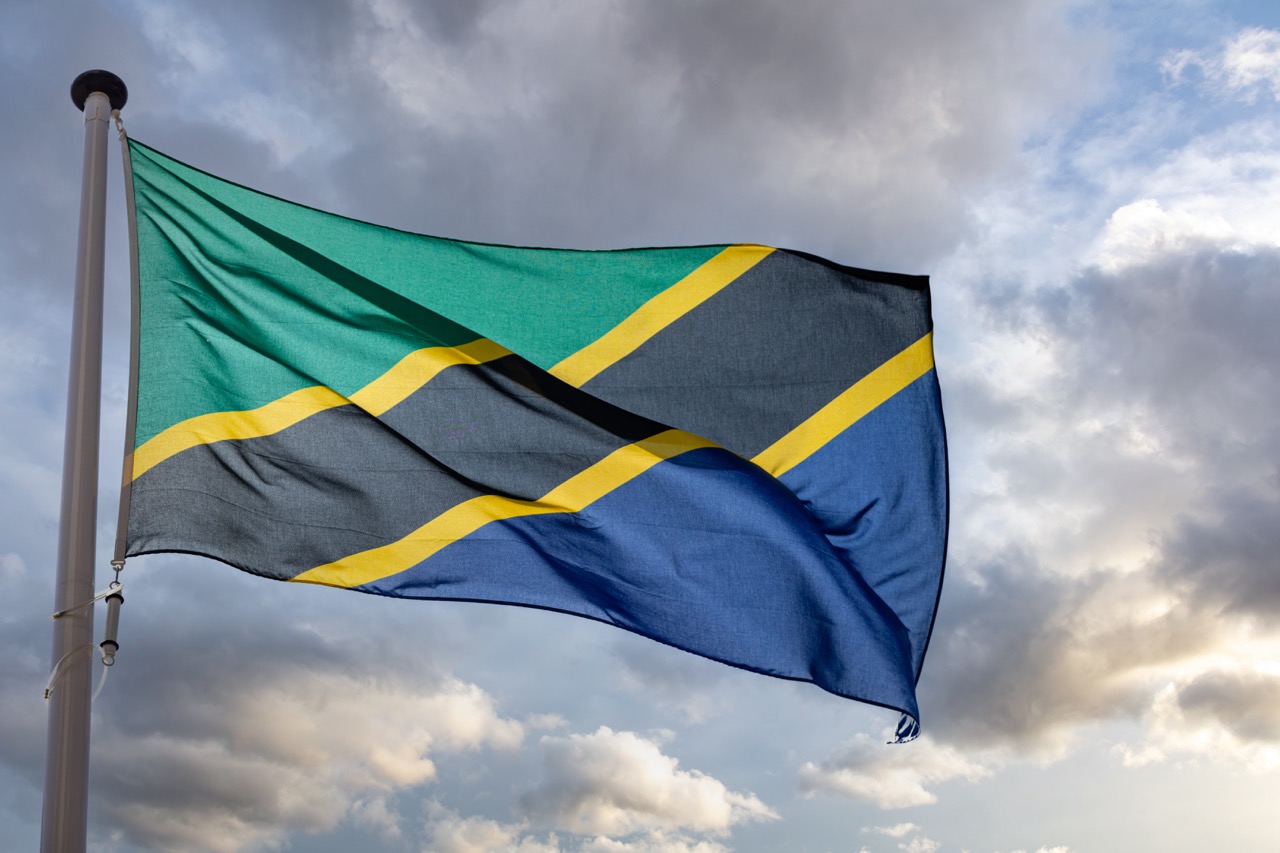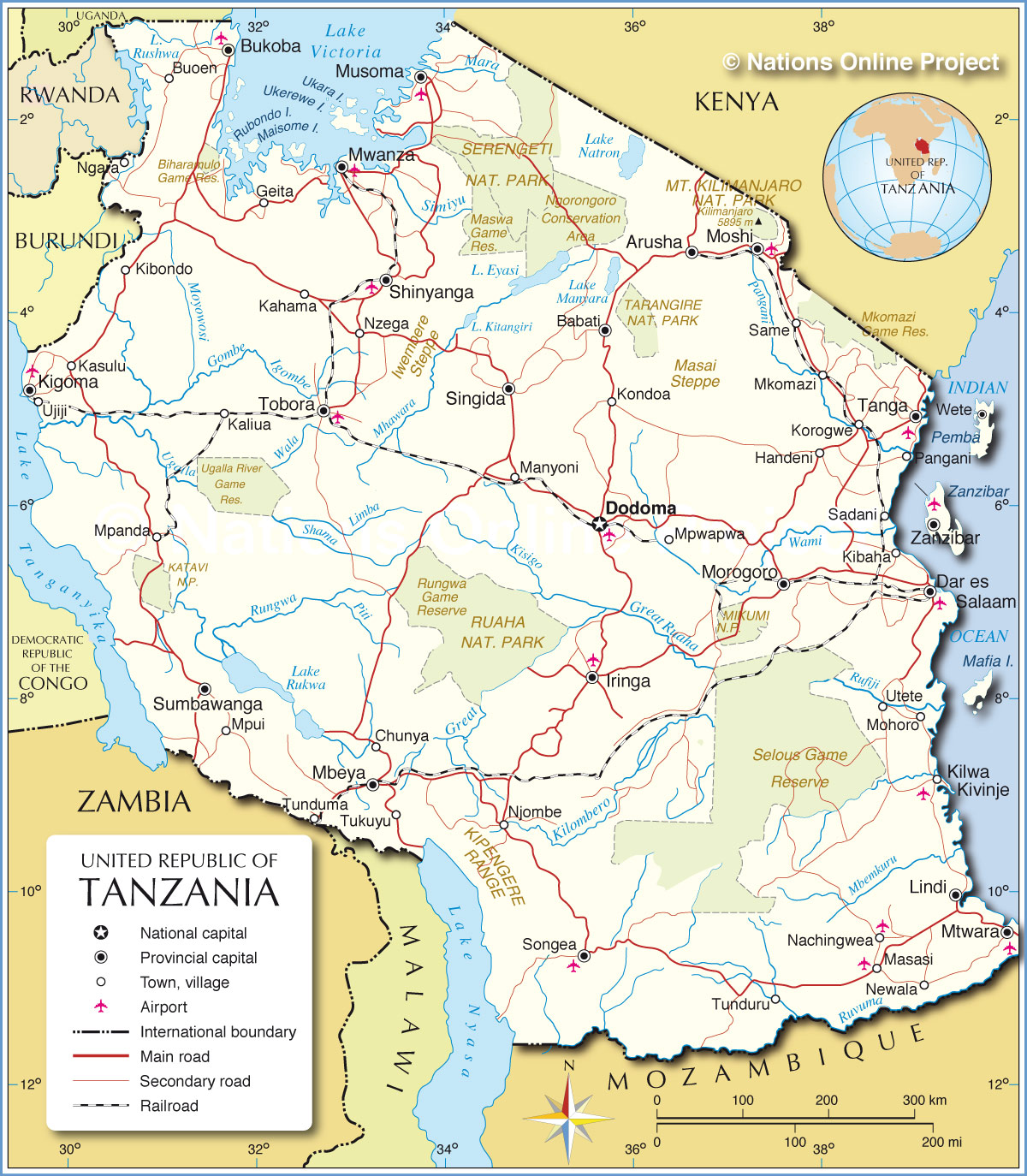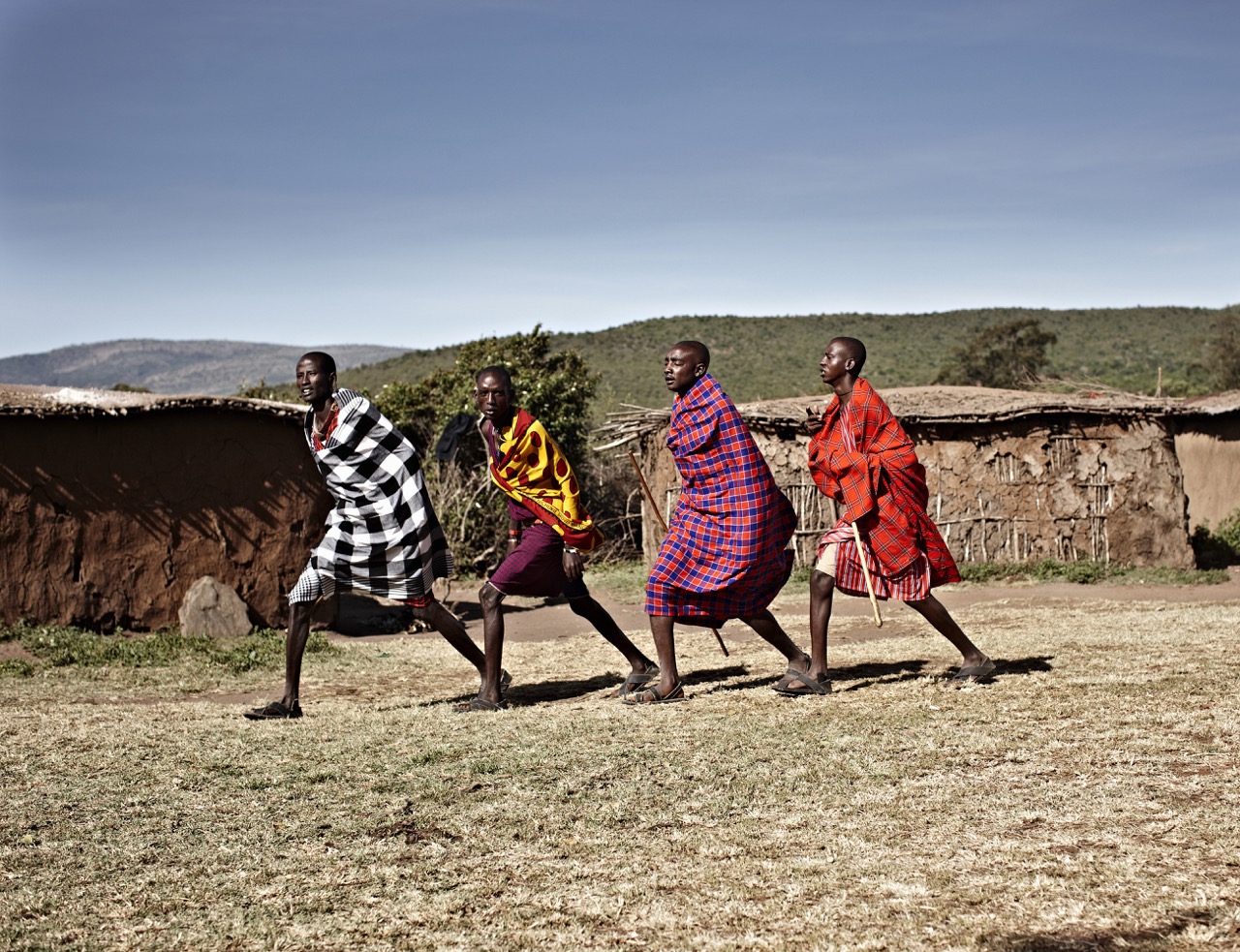The United Republic of Tanzania is one of 53 countries on the beautiful continent of Africa. Tanzania is located just south of the equator, on the Indian Ocean and thus has a tropical climate. Tanzania’s total area, 947,300 square kilometers (365,000 sq. miles), is roughly equal to the area of Texas and New Mexico combined. To its north are the countries of Kenya and Uganda, while Burundi, Rwanda and the Democratic Republic of the Congo lie to its west. The countries of Mozambique, Zambia and Malawi are south of Tanzania. The country’s three major lakes are Lake Victoria (north), Lake Tanganyika (west) and Lake Nyasa (south). Mt. Kilimanjaro of Tanzania is the highest point on the continent soaring to 19,340 feet. Zanzibar, a tropical island just off the coast, is also part of Tanzania as are the smaller islands of Pemba and Mafia. The capital city is Dodoma while the largest city is Dar es Salaam with a population of 7million. Tanzania’s natural resources include: tin, iron ore, phosphates, diamonds, Tanzanites, coal, gems, gold, nickel and natural gas. Agriculture is the foundation of the Tanzanian economy with farmers growing coffee, sisal, tea, cotton, pyrethrum, cashews, tobacco, cloves, corn, wheat, cassava, bananas, fruit and vegetables and raising cattle, sheep and goats. Agriculture accounts for roughly 80% of the economy while service industries (including tourism) account for the remaining 20%. The currency in Tanzania is the Tanzania Shilling (unrelated to Uganda Shilling or Kenya Shilling).



Tanzania’s population in 2013 was 44 million and average life expectancy is 53 years. The adult literacy rate is 72% which is low due to many children leaving school between ages of 13 and 17 for lack of school fees. Tanzania has two national languages: Swahili and English. In addition Arabic is spoken in some places and there are many different tribal languages. There are over 126 ethnic groups Tanzania. The mainland is comprised of 99% Africans and 1% Asian, Europeans or Arabs. Tanzanians are generally friendly and enjoy talking with visitors. Statistics vary on religion in Tanzania depending on who is reporting. There’s an almost even split on the mainland of 30 – 35% Christians and 30 – 35% Muslims, with the remaining 33% practicing traditional African religion. On Zanzibar, 99% of the people practice Islam.
The life of a typical citizen of Tanzania is difficult. By international poverty standards, Tanzania has the highest rate of extreme poverty in the world, higher than any other country. 88.5% of the people live on less than $1.25/day while 96.6% live on less than $2/day (World Bank; Country Brief 2009). Tanzania is one of sub-Saharan Africa’s top recipients of international aid due to political stability and a willingness to pursue economic reform. Tanzanians say, “Karibu” (welcome) when you come to their home and in this same spirit, Tanzania has a long history of hosting refugees. Currently there are refugees from the Congo and from Burundi.
Tanzanians enjoy a sense of peace and freedom in the daily routines of life, and they value community and togetherness very highly. Religion is an integral part of each community, and tends to bind people to their neighbors. Tanzanians practice Christianity, Islam, and traditional African religions. There is a spirit of tolerance and understanding between the various faiths. While religion may define an individual’s identity, culturally, people all agree that they are proud to be Tanzanians.
Some of the earliest evidence of mankind has been found in Tanzania. The first humans were hunter-gatherers. Around the 4th century AD, the Bantu people migrated to Tanzania, bringing iron tools and weapons. By the 8th century, Arab merchants sailed to Tanzania bringing Islam and new ideas. During the 15th – 18th centuries, ancestors of the Maasai people migrated down from Sudan. In 1498 Vasco Da Gama was the first European to arrive in Tanzania. He was an explorer from Portugal. The Portuguese controlled Zanzibar and the coast of Tanzania from the 1500s until 1700 when they were driven out by Arabs. In the 18th and 19th centuries, Arab slave traders took huge numbers of slaves and exported them to Europeans and Arabs. Germany ruled Tanzania from 1887 – 1916. There was much resistance to German rule as the people resented German interference. The Germans ruled with an “iron fist” crushing each rebellion from 1887 until 1916 and the beginning of WWI. After Germany lost WWI, Tanzania was turned over to Great Britain in 1918. It was called Tanganyika. The British ruled Tanzania as their colony from 1916 – 1960. Tanzanians won independence peacefully from the British in 1961 and named Julius Nyerere prime minister. In 1964 Nyerere unified Zanzibar with the mainland and renamed the country The Republic of Tanzania. At that time, Tanzania was indeed a Republic, but several years later in 1967, Nyerere adopted a new policy of socialism. In the following ten years, 80% of the population was forced to resettle onto collective farms. The economy crashed, agriculture failed and starvation killed about one million people in the late 1970s. After witnessing his socialist attempt fail for many years, Nyerere finally resigned in 1985. The next Prime Minister, Mwinyi, spent the following 10 years trying to repair the failing economy, by privatizing business, encouraging foreign investment, and eliminating corruption. The economy began to grow steadily. In 1992 Tanzania became a multi-party democracy and Mkapa became president. In 2005 Jakaya Kikwete was elected President. Today the government continues to seek international aid and is making efforts to reduce poverty and raise literacy rates.
Tanzania has a variety of tourist attractions from natural wonders to cultural attractions. Visitors enjoy touring National parks, game preserves and zoos to scout for wildlife. Some of the major national parks include, Serengeti, Ngorongoro Conservation Area, Tarangire, Mikumi National Park, Kilimanjaro National Park and Ruaha National Park. There are many more, smaller game parks.
The Kilimanjaro National Park boasts the highest peak on the African continent, Kilimanjaro (5896 meters). It is the world’s tallest free-standing mountain. Historians estimate that the mountain was formed some 750,000 years ago. A German missionary was the first European to see the snow-capped mountain in 1849. Later, Hans Meyer, a geographer, was the first European to summit the peak of Mt. Kilimanjaro. The caldera has a diameter of 72 km. Today Kilimanjaro is a dormant volcano. It’s best to visit Kilimanjaro during the dry seasons (December – February or July – September).
The great rivers of Tanzania include the Wami, River, and Malagarasi Rivers. Tanzania’s fresh-water lakes include Lake Victoria, Lake Tanganyika, and Lake Nyasa.
The country’s currency is the Tanzania Shilling. Rates fluctuate daily. You can check for an approximate rate before you travel at www.coinmill.com. Traveler’s Checks are rarely used in Tanzania and you will have difficulty converting them to cash. You will be able to change US dollars and Euros in Dar es Salaam. It’s helpful to change your trip funds at the beginning of the trip, as it may be difficult to find another bureau de change open in a place and at a time convenient to you. Many locations will not take small denomination bills (such as usd $1, $5, $10 and $20). Also, bills will be refused if they are torn, marked on, or older than 2006. Try to bring USD in fifties or hundreds with a date of 2006 or later. Many places now also accept debit cards. This is good for those visitors needing additional funds, but do not count on a debit card as your sole source of funds. Often due to power outages or other reasons, many debit machines are “down.” Bank issued “Gift Cards” which function much like a debit card are not accepted in most places in Tanzania (one tourist sadly had all her funds on one gift card, which her American bank advised her to bring). Credit cards are accepted generally at large, modern stores in Dar and at higher priced hotels.
Tanzania is a politically stable and safe country to visit. It is important to keep your valuables locked up or on your person as pickpockets are hoping you won’t! Americans should check with travel.state.gov for country-specific travel warnings and to register with the U.S. Embassy before traveling. Keep a copy of your passport separate from your passport during your trip. Also, leave an additional copy of your passport and other important documents (such as flight information) at home with a relative.
Greetings – ways to say hi, hello, or how are you and the appropriate response
Hello and response Jambo –sijambo
How are you? Good! Habari? – nzuri
Good morning, how are you?Habari za asabuhi?Salama
What’s up? Cool! Mambo – poa
Goodbye – kwaheri!
See you (later) – tutaonana!
Let’s go! – twende!
Stop! – simama!
Animals
Cat – paka Rhino – kifaru
Dog – mbwa Hippo – kiboko
Goat – mbuzi Leopard – chui
Chicken – kukuElephant – tembo
Lion – samba Giraffe – twiga
Eating
Food – chakula Cold – baridi
Salt –chumvi Hot, Warm – moto
Sugar – sukari Water – maji
Other useful words
Thank you – asante (said to one person)
Your welcome – karibu
Yes – ndiyo
No – hapana
Okay –sawa
It’s most economical to purchase a SIM card from a local carrier plus airtime and use the sim card in your unlocked phone or in an inexpensive phone purchased in Tanzania (about $35). The sim card is a couple of dollars and you can start with about $10 airtime for mostly texting or $20 in airtime for more calling. Dial the USA: +1 area code, number (for example: +1-805-555-5555)
If you’ve brought a “world” phone from the States and are using Verizon, AT&T, etc. be sure to turn off all gps, data services, and notifications. All of these will result in very expensive surprises upon your return home. Stick to short phone calls and text messages to the USA and keep the world phone turned off unless you are using it.
Jambo . . . . . . . . Jambo bwana!
Habari gani? …..Nzurisana!
Wageni . . . . . . . mwakaribishwa
Tanzania yetu . . Hakunamatata
Verse: Tanzania nchinzuri Tanzania yetu
Nchi ya maajabuHakunamatata
Nchi ya kupendezaTanzania wote
Hakunamatata (ad lib)
You are most welcome in Tanzania! If you have questions not addressed in this short guide, do not hesitate to ask your guide. We are here to assist you and to make your visit to Tanzania a most memorable time!
WhatsApp us